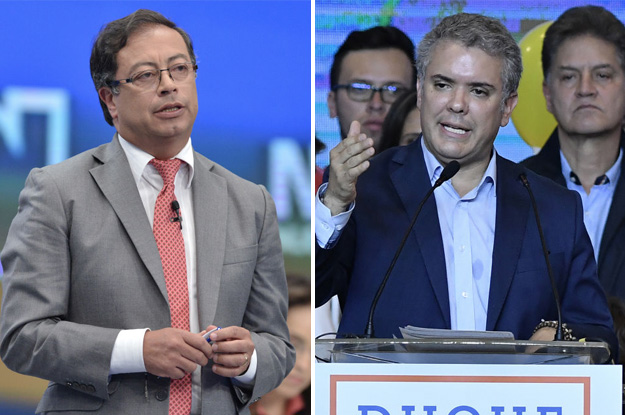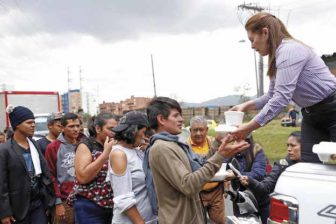In a break from the new normal of innacurate polls and stunning political upsets, Colombia’s first-round presidential vote on Sunday went mostly as expected. Iván Duque, a conservative former senator, will face off against Gustavo Petro, the leftist former Mayor of Bogotá, in second-round voting on June 17.
As most polls predicted, Duque finished with a clear advantage. But a deeper look at Sunday’s vote reveals significant shifts in Colombian politics that will play out long beyond inauguration day. Here are five takeaways from the first round:
Et tu, Duque?
After winning close to 40 percent of votes on Sunday, Duque is the odds-on favorite to sit in the Casa Nariño come August. That suggests a business-friendly climate under Colombia’s next governement.
“Markets have, rightly in our view, started to price out political risk in Colombia in recent months,” Edward Glossop, emerging markets economist at Capital Economics, a London-based macroeconomic research firm, told AQ.
But in his quest to secure support from centrist voters, Duque may have to soften his approach on key elements of the Democratic Center’s party platform – particularly its staunch opposition to President Juan Manuel Santos’ 2016 peace agreement with FARC rebels.
“Thirty percent of the vote went to liberals and a further 47 percent (of the voting population) abstained,” Arthur Dhont, a Colombia analyst for IHS Markit, a political risk consultancy, told AQ. “That could mean (Duque) reducing his hostility towards the peace process.”
The next three administrations are legally bound to abide by the terms of the peace deal. But Duque has proposed tougher prosecution of FARC leaders for drug crimes and in general takes an unsympathetic view of the agreement. Any softening on that position could antagonize hardline anti-FARC ex-president Álvaro Uribe, Duque’s political patron.
“The second round raises a fascinating prospect,” said Dhont. “Uribe holds that he was betrayed by Santos, his chosen candidate in 2010. Will Duque do the same?”
The Left Unleashed
It turns out that the biggest obstacle to left-wing politics in Colombia was the guerrilla all along. In the first presidential election since the FARC put down its arms, Petro has emerged as the first left-wing politician with a realistic hope of becoming president since Jorge Eliécer Gaitán, whose 1948 assassination led to the Bogotazo and helped spark the Colombian civil war. Tellingly, Petro, who was once a member of the M-19 guerrilla group, polled best in the country’s poorest regions.
“The left has seen an incredible resurgence,” Sylvia Sus, a researcher at Congreso Visible, a think tank, told AQ. “In a country which has historically leaned to the right, for Petro to win nearly 5 million votes is an incredible feat.”
Petro has established the demand for redistributive politics, even if his proposal to replace extractive industries with avocado production appears wildly ambitious. Nevertheless, he will have his work cut out in the second round.
“(Petro) will have to tack to the center and his only hope is to get the liberals on board,” said Dhont. “He is going to face accusations of being a Chavista and he’ll retaliate with accusations of Uribe’s links to paramilitary groups and drug dealers. There’s going to be a lot of mud slung.”
The Middle Misses
Back in March, AQ suggested that attempts to unify Colombia’s center could be crucial to deciding its next president, and so it turned out. On Sunday, former Governor of Antioquia Sergio Fajardo closed the gap on Petro, falling less than 300,000 votes short of a second-place finish. Had fellow centrist Humberto de la Calle’s votes been cast his way, it would be Fajardo in the second round.
“Both Fajardo and De la Calle share the blame for failing to unite, putting party politics ahead of the national interest,” said Sus. “Things could have been very different, a centrist candidate could have united the left-wing vote in the second round, but it will be much harder for Petro to win centrist votes.”
Some polls show that Fajardo would have been a strong favorite to beat Duque in the second round. Does Fajardo have the stamina to run again in 2022? In the event of a Duque presidency, the question of whether he or Petro becomes the de facto head of the opposition may be the most important in Colombian politics.
We’re All Populists Now
Colombia’s campaign season has been awash in fake news, cynical misrepresentation of facts and shameless fear-mongering. La Silla Vacia, an independent news site, ran a lie-detector service throughout the campaign, fact-checking candidates in debates and interviews. Petro and Duque regularly topped the charts for false or misleading statements.
“Populists prey on the emotional hopes and fears of the electorate, with scant regard for the facts, and it was a feature of the campaigns of Petro and Duque,” said Andrés Fernandez, an independent political analyst. “Petro proposed a no-carbon economy and reforms to the pension and health sectors that sound great but are impossible to enact in the timescale he promises. Duque based his campaign on the idea that the country was going to become Venezuela despite the fact that Colombia has strong institutions and Petro and the FARC have minimal presence in the legislature.”
Both candidates were united in criticizing electoral authorities before the vote. “Each candidate sewed rumors of electoral fraud. The unfounded erosion of faith in Colombia’s institutions is bad for democracy,” said Fernandez.
The End of an Era
The two candidates closest to Santos – De la Calle, his chief peace negotiator, and Germán Vargas Lleras, his former vice president – failed to muster 10 percent of the vote on Sunday. Santos shuffles of the political stage with a personal approval rating of 14 percent. But he also ended a more than 50-year-old conflict and, despite a bumpy economic record hindered by low oil prices, his eight years in power saw significant improvements in indices relating to poverty, crime, investment, unemployment and healthcare.
Simón Bolívar, another Latin American leader who perhaps didn’t receive the send-off he deserved, wrote on his way to exile in 1830, “I am determined never to return, nor to again serve my ungrateful countrymen.” Santos is unlikely to sulk like Bolívar, nor is he likely to rage on in political life like his predecessor, Uribe. We’re more likely to find Santos on the Latin American speakers’ circuit, admiring his Nobel Peace Prize and awaiting historical absolution.
—
Youkee is a journalist based in Bogotá








